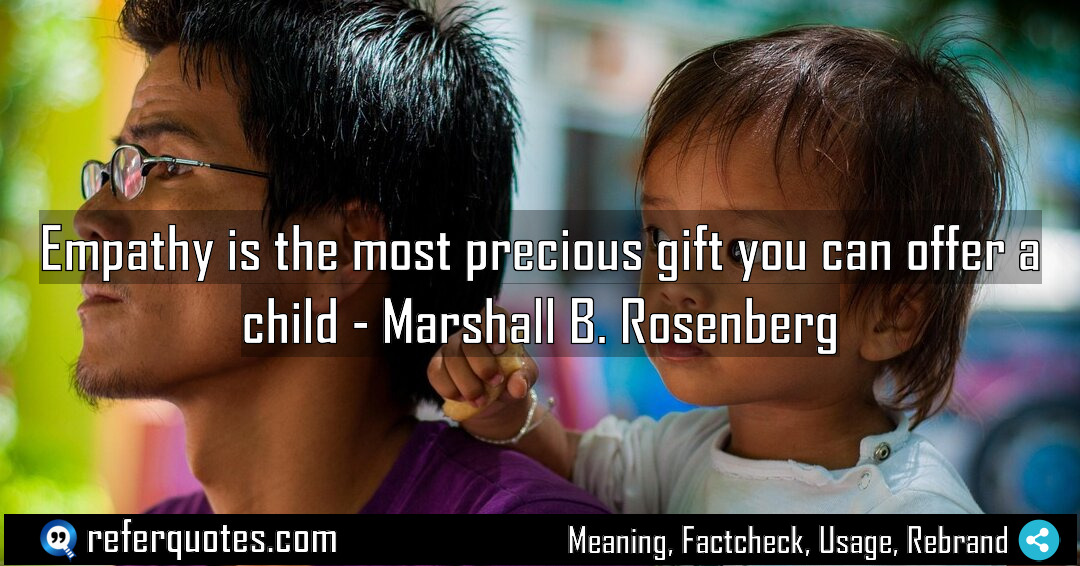
Empathy is the most precious gift you can offer a child because it’s the foundation for everything else. It builds connection, teaches emotional intelligence, and shows them they’re truly seen. This isn’t just a nice idea; it’s a practical parenting superpower.
Share Image Quote:
Table of Contents
Meaning
It means that truly understanding and connecting with a child’s feelings is more valuable than any toy, lesson, or correction.
Explanation
Look, we get so caught up in providing for our kids—the right schools, the healthy food, the extracurriculars. But Rosenberg is pointing to something deeper. He’s saying that when a child feels felt, when they know their inner world matters to you, that’s what builds real self-worth and security. It’s not about fixing their problems immediately. It’s about being present with their experience, whether it’s joy or a full-blown tantrum. That presence is the gift.
Quote Summary
Reading Level68
Aesthetic Score89
Origin & Factcheck
This comes straight from Marshall B. Rosenberg’s 2005 book, Raising Children Compassionately. It’s a core tenet of his Nonviolent Communication (NVC) framework. You won’t find it attributed to anyone else because it’s pure Rosenberg, born from his life’s work in conflict resolution.
Attribution Summary
Where is this quotation located?
| Quotation | Empathy is the most precious gift you can offer a child |
| Book Details | Publication Year/Date: 2004; ISBN/Unique Identifier: 9781892005140; Last edition: PuddleDancer Press, 1st Edition, 48 pages. |
| Where is it? | Chapter: Gifts of the Heart, Approximate page from 2005 edition |
Context
In the book, he’s not just talking about being nice. He’s giving parents a concrete tool to replace punishment and reward systems. The “precious gift” of empathy is the engine for a completely different kind of relationship—one based on mutual respect and compassionate understanding, not control.
Usage Examples
So how does this look in real life? It’s for any adult interacting with a child.
- For a parent: Instead of saying “Stop crying, it’s just a scratch,” you get down on their level and say, “That looked like it really scared you. It’s okay to be upset.” You’re offering the gift of validation.
- For a teacher: A student is acting out. Rather than immediate detention, you might pull them aside and say, “You seem really frustrated right now. Want to talk about what’s going on?” You’re offering the gift of curiosity instead of judgment.
- For a coach: A kid misses the winning shot. Instead of “You’ll get it next time,” you say, “That’s a tough feeling, to come so close. I’d be disappointed too.” You’re offering the gift of shared humanity.
To whom it appeals?
Share This Quote Image & Motivate
Motivation Score86
Popularity Score82
Shareability Score86
Common Questions
Question: Isn’t this just permissive parenting?
Answer: Not at all. Empathy comes first, but boundaries are still essential. You can empathize with their anger (“I see you’re really mad that screen time is over”) while still holding the limit (“And the rule is the TV goes off now”). The empathy makes the boundary easier to accept.
Question: What if I can’t figure out what they’re feeling?
Answer: You don’t have to be a mind reader. The attempt is what matters. Just saying, “Wow, you’re having some big feelings right now. I’m here,” is still offering the gift. Your presence is the key.
Question: How is this a “gift” they carry forward?
Answer: This is the magic part. When children consistently receive empathy, they internalize it. They learn how to understand and manage their own emotions. And crucially, they learn how to offer empathy to others. You’re literally shaping a more compassionate future adult.
Similar Quotes
Empathy is the most powerful form of love we can offer because it’s not about fixing. It’s about truly connecting with a child’s world, which builds a foundation of trust…
Our empathy is the bridge that helps children cross… it’s not just a nice sentiment. It’s a functional, practical tool. I’ve seen it transform meltdowns into moments of connection. It’s…
To nurture empathy in children, we must first give them space. It sounds simple, but this is the foundational secret. You can’t teach compassion if a child feels emotionally unsafe.…
You know, when Marshall Rosenberg said “Children need empathy, not evaluation,” he hit on something so fundamental. It’s a game-changer for how we connect with kids, shifting our focus from…
When we respond with empathy, we give our children something profound: permission to be human. It’s a simple but radical shift that transforms parenting from correction to connection, and honestly,…
